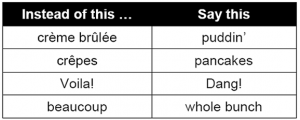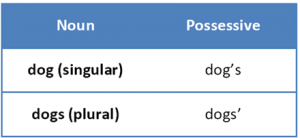Rebecca Lyles's Blog, page 8
March 28, 2015
Words aren’t pompous—people are.
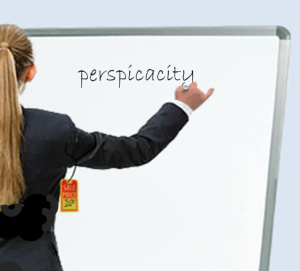 With few exceptions, pompous words have appropriate times, places, and audiences. It’s their inappropriate use that makes them offensive. I remain unconvinced that utilize needs to exist, but we’ll skip that one for now.
With few exceptions, pompous words have appropriate times, places, and audiences. It’s their inappropriate use that makes them offensive. I remain unconvinced that utilize needs to exist, but we’ll skip that one for now.
Writers on the TV comedy Frasier must have had great fun creating dialog for their condescending, self-important characters. It gave them a chance to use words like propinquity, soupçon, and insouciance. Most viewers didn’t know what they meant, and that was exactly the point.
If we encounter pretentious prose in written form, we can always look up the words or stop reading. But a business meeting with an affected speaker is a special kind of torture. After a minute or two, we’re all looking at our watches, making grocery lists, hiding our phones under the table, and checking emails. It’s clear that the speaker’s goal is to impress, not to communicate.
Here are three words often used (or misused) by poor communicators.
inchoate
Means partial or incomplete. If you’re a lawyer addressing other lawyers, use inchoate with my blessing. Otherwise, think about your audience. Spare them the temptation to mutter “puh-leeze” under their collective breath and zone out.
ascertain
Means find out or determine. As in, “How did you ascertain that data?” If your audience is a group of college professors, they won’t even blink. A general business audience will know what you mean, but many will roll their eyes as if you’d worn a tuxedo on Casual Friday. So just say find out or determine.
verbiage
My favorite. No one uses this correctly. When you tell the graphic designer you want “some verbiage about our product under the logo,” you’re saying you want some unnecessarily long-winded, verbose language. Instead of verbiage, say text or words. If you do use it correctly, remember that it has three syllables: VUR-bee-ij (not two syllables, like garbage).
When your purpose is to impress, rather than communicate, you invite your audience to subconsciously lie in wait—hoping you will make a mistake. When you do, they attack without mercy. People love to find fault with a know-it-all.
I once attended a lecture by a well dressed, arrogant woman who spent two hours boring the audience with polysyllabic—ah—verbiage. Her presentation was oddly unsuitable for the topic and as the audience grew restless she droned on, oblivious to their lack of interest . When she left the podium and raised her arm to write on the whiteboard, they broke into loud guffaws. There it was, dangling from her new suit. A red price tag with the word SALE.
Mmmmmm. Karma.
Like TextCPR on Facebook !
March 21, 2015
Four steps to Marketing-speak
 Did you ever read product information on a web site and wonder what the they’re selling? An Emperor’s New Clothes mystique surrounds much of today’s business marketing copy.
Did you ever read product information on a web site and wonder what the they’re selling? An Emperor’s New Clothes mystique surrounds much of today’s business marketing copy.
The reader has no idea what it means, but is afraid to admit it. The writers think they’ve impressed him.
It seems hard, but you too can learn to write like this. Here are four tips to help you write turgid, meaningless copy that will confuse everyone … especially your customers.
1. Pile on the buzzwords
No marketing text is complete with out at least five of these faddish obfuscators (like that one?):
Leverage, impact (as a verb), solutions, processes, issues, utilize, maximize, minimize, digitize, systematize, productize, strategize, optimize, dramatically, functionality, capabilities, efficiencies.
2. Loooooong sentences
String together as many subordinate clauses, parenthetical expressions, noun clumps, and gerunds as possible.
3. Modifiers
Bring on the adjectives, adverbs, and entire phrases to describe whatever you’re selling (but don’t reveal what it actually is).
4. Prepositional phrases
Nothing puffs up your description like lots of prepositions.
Here is a before-and-after illustration that shows how you can take a clear idea and translate it into Marketing-speak.
Example — before
Our software products handle invoices, accounts, and service requests. They do it better than the manual way you’re probably doing it now. Save money, serve your customers promptly, stand out from your competitors, and see your business increase. Call us today.
Example — after
Organizations like yours leveraging manual, resource-intensive, complex, and error-prone processes can significantly increase their responsiveness to customers in information-intensive, real-time interactions, dramatically maximize their level of service, gain competitive advantage over others, and better manage and grow their businesses while also greatly reducing operating costs by utilizing the functionality and capabilities of our solutions.
No, really.
Don’t.
Like TextCPR on Facebook !
March 14, 2015
French Revolution?
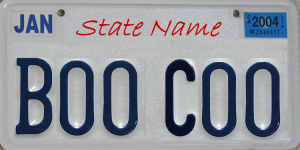 To sound “classy” (as anyone who uses that word to describe himself isn’t), drop a few French words into the conversation. To sound ignorant, drop in a horribly mispronounced French word.
To sound “classy” (as anyone who uses that word to describe himself isn’t), drop a few French words into the conversation. To sound ignorant, drop in a horribly mispronounced French word.
But to sound completely stupid, use a couple of nonsense syllables that started out French and mutated into American Hillbilly.
Well-meaning Americans can be excused for not getting French pronunciations quite right. French has entirely too many silent letters, and the vowel sounds feel uncomfortable in our mouths. The best most of us can do is try.
So here are two popular menu items anyone can say:
crème brûlée – KREMM broo-LAY (not KREEM broo-LAY)
The crème rhymes with stem, not steam. Here’s another:
crêpes – KREPPS (not KRAPES)
Rhymes with steps, not grapes.
Mispronouncing is one thing, but writing is another. It’s bad enough when speakers pronounce these next examples. When people actually write them, it’s inexcusable:
wa-la!
Used in a moment of revelation. “Beat the egg whites until stiff, and – wa-la! Meringue!” When pronounced, it sounds close to Voila! But every time someone writes it, Inspector Clouseau spins in his grave. Oh – and notice that it’s V-O-I-L-A, not V-I-O-L-A (a viola is a stringed instrument similar to a violin).
My personal favorite:
boo-coo
Most often followed by bucks. As in, “Man, that musta cost boo-coo bucks!”
A few people might have started this in fun, intentionally mispronouncing beaucoup (it rhymes with GO TO, not cuckoo) but it’s become common among speakers and writers who have no idea where it originated.
Let’s just fix this once and for all. For those determined to mangle French words (while insisting that everyone else should “speak English, dammit”), here are some easier substitutes:
Like TextCPR on Facebook!
March 7, 2015
Verses versus versus
 They’re at it again – smart people who confuse similar-sounding words. Spellchecker tells you they’re correctly spelled, but can’t tell you how to use them.
They’re at it again – smart people who confuse similar-sounding words. Spellchecker tells you they’re correctly spelled, but can’t tell you how to use them.
In an article about a company’s accounting woes, I saw:
They could have prevented the disparage …
OK, class, disparage is a verb. It means to speak negatively about someone or something. In slang terms, disparage means bad-mouth. In any case, it cannot function as the direct object of the verb prevented.
The word this writer was going for is disparity. It is a noun, and it has nothing to do with bad-mouthing. It means difference. In the article, it was clear that the writer meant the funds reported from two sources did not match. It would have been appropriate to disparage whoever was responsible for the disparity.
An otherwise informative article discussed the merits of various seat choices on airplanes.
Some people prefer an isle seat …
Isle is a shortened, somewhat poetic form of island. As in The Isle of Capri or Ireland, the Emerald Isle. Better to be in either of those places than stuck on an airplane in any seat. That narrow passage where they push the food carts and whack your elbows is the aisle.
I almost hesitate to include sports writers in the “smart people” category, although there are many smart sports writers. Sadly, some were hired for their subject knowledge despite their abysmal use of English. In a field where face-offs are common, team against team, individual against individual, or individual against record, you’d think this one would never occur. But it does:
Next week’s matchup features the Angels verses the Red Sox …
Unless the contest requires baseball players to go head-to-head in a freestyle rap competition, spontaneously spouting rhyming couplets, they mean versus.
Versus comes from Latin, and it means against, or opposed to. It can be spelled out or abbreviated either vs or v (in legal usage, with or without periods after). As in Angels versus Red Sox, Marbury vs. Madison, or Roe v Wade.
Some errors just drive me to curses –
All tact and decorum disperses.
…..There’s you’re and there’s your,
Two, to, too and more,
And don’t forget verses v. versus!
Like TextCPR on Facebook!
February 28, 2015
Apostrophe apoplexy
 We almost expect to see misspelled words and misused apostrophes in hand-lettered signs selling fruit. It’s as if there’s an unwritten rule that delicious, home-grown fruit requires a lack of attention to spelling or punctuation.
We almost expect to see misspelled words and misused apostrophes in hand-lettered signs selling fruit. It’s as if there’s an unwritten rule that delicious, home-grown fruit requires a lack of attention to spelling or punctuation.
Fresh Cantalope’s by the side of the road seem to taste better than Fresh Cantaloupes you can buy at any old grocery store.
The rules for plurals and possessives are pretty simple and apply to a majority of cases:
Plaintiffs’s?
But a legitimate industry magazine says, “HP and respected plaintiffs’s lawyers entered into an agreement …” Not just a typo, it occurs three times in the article. Someone did that on purpose. The word plaintiffs was already plural and required only an apostrophe to make it possessive.
Try to say plaintiffs’s three times without sputtering.
Lex’
To make a plural, add an s. To make a possessive, add an apostrophe and an s. If only life were that simple. How about nouns that already end in s or es? Or ss? Or z or x? How do we make them plural and possessive, and how about the apostrophe? That’s when it all goes terribly wrong.
Lex, a beloved member of a local tennis club died tragically. The well-meaning club management remodeled and renamed the bar in his honor. Emblazoned on the window in neon for years, it said Lex’ instead of Lex’s. If his name had been Joe, it would have said Joe’s. But the x threw everyone.
I knew Lex, a literate man. I always imagined him looking down with reluctant disapproval … touched by the tribute, but embarrassed by the error.
Some exceptions send you running to your trusty Chicago Manual of Style, but generally:
Just cheat
Above all, don’t agonize over this one. The difficult cases are perfect opportunities for writing around the problem. For example, let’s say you need to write:
“For (appearance’ or appearance’s) sake, don’t post (James’ or Jameses’), (Moises’ or Moiseses), and (Elvis’ or Elvis’s) test scores.”
Just say:
“For the sake of appearance, don’t post the test scores for James, Moises, and Elvis.”
… then take the rest of the day off.
Like TextCPR on Facebook !
February 21, 2015
Two kudos, one kudo?
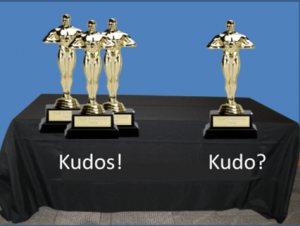 As if English weren’t baffling enough, we’ve imported words from many other languages. And sometimes the process of assimilation grinds them up into barely recognizable bits. All the native rules for forming plurals, for example, become murky or simply go away.
As if English weren’t baffling enough, we’ve imported words from many other languages. And sometimes the process of assimilation grinds them up into barely recognizable bits. All the native rules for forming plurals, for example, become murky or simply go away.
Among other indignities, we subject these adopted words to back-formation. Singular Greek words, particularly those ending in s or x, sound to many English-speakers like plurals. So we feel compelled to invent a singular form that was never necessary in the original language.
Case in point: Kudos, a singular Greek word, originally meant congratulation or honor. Then it became popular in business (“Kudos to the Quality Team for their good work!”) and we ended up with “… and a special kudo to the Team Leader.” [Insert palm-to-forehead gesture here.]
I once attended a technical writing seminar led by a highly touted PhD expert. When an audience member asked how to deal with an off-topic piece of information, Mr. Expert said:
Well, you could put it in an appendisee (phonetic spelling).
It’s as if, in an attempt to show off his knowledge of Greek plurals (appendices) he forgot that appendix was already a perfectly good singular word. Two kudos, one kudo. One appendix, two appendices … back-formed to one appendice? Does that mean we would also say one vertice, one matrice, one indice?
If we’re determined to claim these words in English, it makes more sense to accept them as singular and then pluralize them in English: vertexes, matrixes, and indexes. Maybe we would be less likely to back-form them into absurd singular-sounding words. Most authoritative sources accept appendixes as an acceptable plural of appendix. My college roommate used to say (jokingly), “I have a sniffle – better get some Kleenices.”
Several English words are always plural (eyeglasses, tongs, scissors, trousers, pliers), and no singular form makes sense. We often preface them with pair of just to be clear. Although one eyeglass could be a monocle, the others are not logically divisible. If you’re into Zen, please don’t write to me about the sound of one hand clapping.
All of this chao gives me a headache. I may be a smartypant, but I’m going to put a molasse on my pancake, bid you adio, and rendezvou with an undiscovered specie on some remote island. Perhaps a Galapago.
Like TextCPR on Facebook !
February 14, 2015
Beyond the pail
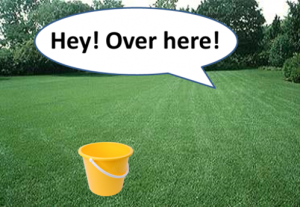 When mispronounced or misspelled, many common words and expressions suggest silly pictures that can help you to remember the right way to say or spell them. Here are three of my favorite examples:
When mispronounced or misspelled, many common words and expressions suggest silly pictures that can help you to remember the right way to say or spell them. Here are three of my favorite examples:
beyond the pail (instead of beyond the pale)
The correct version, “beyond the pale,” originated centuries ago in Europe and referred to an actual fence or implied boundary (The Pale) around an area of land controlled by ruling forces. Areas outside – or beyond – The Pale were considered hostile or dangerous territory. The expression now means outside the boundaries of accepted, or civilized, behavior. At no time in history were buckets involved.
 wreckless driving (instead of reckless driving)
wreckless driving (instead of reckless driving)
Reckless (without the w) describes a situation in which a driver disregards the rules, behaving carelessly and irresponsibly behind the wheel. Reckless drivers often cause accidents. A wreckless driver (with a w) has no accidents and is the opposite of reckless.
A reckless driver is probably not wreckless for long. That’s English for you.
half-hazard (instead of haphazard)
The correct word, haphazard, means unplanned, irregular, or random. Aimless, dependent on chance. If you’re tempted to say or spell half-hazard, just picture one of these:  Remember: Wreckless and half-hazard, unless they describe one of these pictures, are beyond the pale.
Remember: Wreckless and half-hazard, unless they describe one of these pictures, are beyond the pale.
Like TextCPR on Facebook!
February 7, 2015
5 reasons to use numbers in headlines
 Everyone knows you should stuff numbers into your headlines. If you do, people can’t resist reading the article. Often they’re disappointed, but – hey – they read the article and that’s the most important part. Right?
Everyone knows you should stuff numbers into your headlines. If you do, people can’t resist reading the article. Often they’re disappointed, but – hey – they read the article and that’s the most important part. Right?
It’s not a new technique, but it has reached ridiculous levels of usage online. The Internet rewards “clicks” without regard to the quality or usefulness of the content. We all know that, so why do we fall for it?
Because we just can’t help ourselves. Here are the *top five reasons people use numbers in their headlines:
1. They sound specific.
A numbered list of steps will lead you directly to the solution you want. Whatever it is you’re looking for, you’ve found the answer and it’s right here!
2. They promise small chunks.
No long paragraphs to read, probably no big words, and lots of white space. What could be easier to scan, skim, and digest? (Or write?)
3. People count to ten better than they read.
Even a generation of TV-watching children who have never read a book can recognize the numbers 1-10. It’s how many fingers they have.
4. They make complex tasks sound simple.
If it can be reduced to a short, numbered list, how hard can it be? No education necessary, no boring tests – even you could do it!
5. They make the information seem credible.
As if it were the result of research or some kind of controlled study. It’s actually anything you want to make up to fit the number you wanted to put in the headline. Example: The claim *top five reasons I used earlier? I just made that up. Who’s going to argue that there are four reasons? Or six?
Be sure to read my next article entitled 5 steps to performing an appendectomy. Spoiler alert – it’s:
1. Anesthetize patient
2. Make small incision over the appendix
3. Locate appendix
4. Remove it
5. Close incision
Easy!
Like TextCPR on Facebook !
January 31, 2015
Your Honor, I object!
 It’s unfair to pick on the uneducated or those who struggle to learn English. But pretenders and pseudo-academics are fair game. A native English-speaking college graduate with a doctorate and a professional title should display a reasonable use of the language. Particularly if that profession requires skillful, sometimes manipulative, use of English … sprinkled with Latin.
It’s unfair to pick on the uneducated or those who struggle to learn English. But pretenders and pseudo-academics are fair game. A native English-speaking college graduate with a doctorate and a professional title should display a reasonable use of the language. Particularly if that profession requires skillful, sometimes manipulative, use of English … sprinkled with Latin.
Yesterday in a television interview, a prosecuting attorney said (describing a pastor accused of murder):
This man presented himself to the community as a paradigm of virtuosity.
Where do I begin? One of these would be called a malapropism (a speech error in which a word is nonsensical in context, but similar in sound to the correct word). But two of them in the same sentence! That’s difficult to do, even if you’re trying.
Let the court transcript show, the correct idiom is :
paragon of virtue
It means a perfect example (paragon) of purity, goodness, or high moral standards (virtue).
Paradigm, a trendy, overused business buzzword, is just a pattern or example. New paradigm often refers to a different business model or way of doing things.
And virtuosity means great artistic skill, particularly in music. Jimi Hendrix displayed virtuosity on the electric guitar. Clearly, virtue was not a requirement.
So with this malapropism, the attorney literally accused the pastor of presenting himself to the community as a new way to play a musical instrument. Hardly a crime. But she emphasized that, since he had lied, everything he said was questionable. It follows that, since she spoke nonsense, everything else she said was also questionable.
Errors like these occur when we try to add syllables and make ourselves sound important, assuming the audience won’t know the difference. Or when we don’t know the difference ourselves.
Ergo, the Prosecutor ipso facto displays sufficient mens rea in the actus reus. This posturing, double whammy of grammatical absurdity must be some kind of felony. Don’t you hate it when people do that?
Perhaps the defense attorney should have instructed the defendant to stare menacingly at the prosecutor, and to wear one of those T-shirts that says “I am silently correcting your grammar.”
Like TextCPR on Facebook!
January 24, 2015
Asbestos I can
 This one has always mystified me. I can’t figure out why anyone would say it. Today, again, in an otherwise decently written article, there it was. The writer said:
This one has always mystified me. I can’t figure out why anyone would say it. Today, again, in an otherwise decently written article, there it was. The writer said:
As best as I can tell …
The next time you’re tempted to say “As best as…,” think of asbestos – a material formerly used in insulation – that has been linked to lung cancer. Not saying this awkward idiom causes lung cancer, but you never know.
Maybe it sounds close to “As best I can tell …” or “As I can best tell …” both of which make grammatical sense, but sound a little pompous. I expect the next phrase to be something like “my good man.” I guess you could inadvertently write that after binge-watching seven hours of Downton Abbey, but there’s really no other excuse.
English adjectives and adverbs have three forms: Positive, Comparative, and Superlative. Here are some examples: 
The Superlative form is the ultimate degree possible. It means there is no comparison – it’s the maximum. When you say “as ____ as,” you’re describing one thing compared with another. That calls for the Positive form.
As good as gold
As well as possible
As fast as you can
As big as a house
Try substituting the Superlative for any of those. It sounds ridiculous.
As best as gold
As best as possible
As fastest as you can
As biggest as a house
When I hear or read “as best as,” I think of a toddler describing a favorite dessert. “I like cookies but ice cream is gooder – it’s the mostest bestest of all.”
Sure it’s the bestest now, but years from now, the toddler will discover other culinary delights. Like crème brûlée.
Some things just can’t be compared.
Like TextCPR on Facebook!


